人教版必修五Unit5 Workbook
人教版英语必修五第五单元详细课件
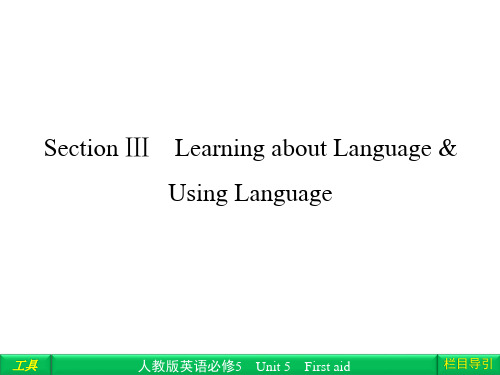
apply oneself to致力于,集中精力于
工具
人教版英语必修5 Unit 5 First aid
栏目导引
工具
人教版英语必修5 Unit 5 First aid
栏目导引
3.The Somali robbers’ frequent attacks on the sea urged the United Nations to________all nations to take immediate action. A.fight for C.call on B.apply for D.wait on
解析: make a (some,no,etc.) difference有(一些,没有
什么)作用;关系;影响。 答案: A
工具
人教版英语必修5 Unit 5 First aid
栏目导引
John was studying in his room when he heard
screaming. 约翰正在屋里学习,这时他听到了尖叫声。
[拓展延伸] make some/a difference (to)(对„„)有作用或影响 make no difference (to)(对„„)没有差别或影响 make all the difference很有影响
tell the difference (between A and B)辨别,区分(A和B
②The nurse is applying some medicine to his wound.
护士正在给他的伤口敷药。
工具
人教版英语必修5 Unit 5 First aid
栏目导引
(2)vi.申请;请求;使用;有效
③He has applied for a job.他已申请了一个工作。 ④My brother has applied to join the army. 我哥哥已报名参军。 ⑤This method doesn’t apply to every case.
2019教育人教版高中英语必修5课件:Unit5 Workbook 共59张PPT数学

poured, over, stop, from, poured, on,
squeezed, out, put, on, tied, around
Answer key for Exercise 3:
you need to practise it over and over again until it’s perfect. a number of them to choose from. as soon as i can put my hands on one. I’ll hold it in place for you while you stick it on the wall. A knowledge of first aid can make a real difference.
JENNY: I’ve heard there’s a ghost in this castle that comes out in the middle of the day.
RALPH: Really? Are you sure?
JENNY: Well, this one’s queen. She was very young and her husband, the king, was very old. He saw her dancing with a young man of the court.
Unit 5 Workbook Reading task
What things at home can be dangerous?
electrical equipment electric fires poisons ladders
knives hot water windows
人教版高中英语必修五电子课本

按住Ctrl键单击鼠标打开配套教学视频名师讲课播放必修5 Unit 1JOHH SHOW DEFEATS “KING CHOLERA”John Snow was a famous doctor in London - so expert, indeed, that he attended Queen Victoria as her personal physician. But he became inspired when he thought about helping or dinary people exposed to cholera. This was the deadly disease of its day. Neither its cause n or its cure was understood. So many thousands of terrified people died every time there was an outbreak. John Snow wanted to face the challenge and solve this problem. He knew that c holera would never be controlled until its cause was found.He became interested in two theories that possibly explained how cholera killed people. The first suggested that cholera multiplied in the air. A cloud of dangerous gas floated aroun d until it found its victims. The second suggested that people absorbed this disease into their bodies with their meals. From the stomach the disease quickly attacked the body and soon th e affected person died.John Snow suspected that the second theory was correct but he needed evidence. So wh en another outbreak hit London in 1854, he was ready to begin his enquiry. As the disease s pread quickly through poor neighbourhoods, he began to gather information. In two particular streets, the cholera outbreak was so severe that more than 500 people died in ten days. He was determined to find out why.First he marked on a map the exact places where all the dead people had lived. This ga ve him a valuable clue about the cause of the disease. Many of the deaths were near the wat er pump in Broad Street (especially numbers 16, 37, 38 and 40). He also noticed that some houses (such as 20 and 21 Broad Street and 8 and 9 Cambridge Street) had had no deaths. He had not foreseen this, so he made further investigations. He discovered that these people worked in the pub at 7 Cambridge Street. They had been given free beer and so had not dru nk the water from the pump. It seemed that the water was to blame.Next, John Snow looked into the source of the water for these two streets. He found tha t it came from the river polluted by the dirty water from London. He immediately told the as tonished people in Broad Street to remove the handle from the pump so that it could not be used. Soon afterwards the disease slowed down. He had shown that cholera was spread by g erms and not in a cloud of gas.In another part of London, he found supporting evidence from two other deaths that wer e linked to the Broad Street outbreak. A woman, who had moved away from Broad Street, li ked the water from the pump so much that she had it delivered to her house every day. Both she and her daughter died of cholera after drinking the water. With this extra evidence John Snow was able to announce with certainty that polluted water carried the virus.To prevent this from happening again, John Snow suggested that the source of all the w ater supplies be examined. The water companies were instructed not to expose people to poll uted water any more. Finally "King Cholera" was defeated.COPERNICUS’ REVOLUTIONRRY THE ORYNicolaus Copernicus was frightened and his mind was confused. Although he had tried t o ignore them, all his mathematical calculations led to the same conclusion: that the earth wa s not the centre of the solar system. Only if you put the sun there did the movements of the other planets in the sky make sense. Yet he could not tell anyone about his theory as the po werful Christian Church would have punished him for even suggesting such an idea. They be lieved God had made the world and for that reason the earth was special and must be the ce ntre of the solar system.The problem arose because astronomers had noticed that some planets in the sky seemed to stop, move backward and then go forward in a loop. Others appeared brighter at times an d less bright at others. This was very strange if the earth was the centre of the solar system and all planets went round it.Copernicus had thought long and hard about these problems and tried to find an answer. He had collected observations of the stars and used all his mathematical knowledge to expla in them. But only his new theory could do that. So between 1510 and 1514 he worked on it, gradually improving his theory until he felt it was complete.In 1514 he showed it privately to his friends. The changes he made to the old theory w ere revolutionary. He placed a fixed sun at the centre of the solar system with the planets go ing round it and only the moon still going round the earth. He also suggested that the earth was spinning as it went round the sun and this explained changes in the movement of the pl anets and in the brightness of the stars. His friends were enthusiastic and encouraged him to publish his ideas, but Copernicus was cautious. He did not want to be attacked by the Christi an Church, so he only published it as he lay dying in 1543.Certainly he was right to be careful. The Christian Church rejected his theory, saying it was against God's idea and people who supported it would be attacked. Yet Copernicus' theor y is now the basis on which all our ideas of the universe are built. His theory replaced the C hristian idea of gravity, which said things fell to earth because God created the earth as the c entre of the universe. Copernicus showed this was obviously wrong. Now people can see that there is a direct link between his theory and the work of Isaac Newton, Albert Einstein and Stephen Hawking.必修5 Unit 2PUZZLES IN GEOGRAPHYPeople may wonder why different words are used to describe these four countries: Engla nd, Wales, Scotland and Northern Ireland. You can clarify this question if you study British history.First there was England. Wales was linked to it in the thirteenth century. Now when peo ple refer to England you find Wales included as well. Next England and Wales were joined t o Scotland in the seventeenth century and the name was changed to "Great Britain". Happily this was accomplished without conflict when King James of Scotland became King of Englan d and Wales as well. Finally the English government tried in the early twentieth century to f orm the United Kingdom by getting Ireland connected in the same peaceful way. However, t he southern part of Ireland was unwilling and broke away to form its own government. So o nly Northern Ireland joined with England, Wales and Scotland to become the United Kingdo m and this was shown to the world in a new flag called the Union Jack.To their credit the four countries do work together in some areas (eg, the currency and i nternational relations), but they still have very different institutions. For example, Northern Ir eland, England and Scotland have different educational and legal systems as well as different football teams for competitions like the World Cup!England is the largest of the four countries, and for convenience it is divided roughly int o three zones. The zone nearest France is called the South of England, the middle zone is ca lled the Midlands and the one nearest to Scotland is known as the North. You find most of t he population settled in the south, but most of the industrial cities in the Midlands and the N orth of England. Although, nationwide, these cities are not as large as those in China, they h ave world-famous football teams and some of them even have two! It is a pity that the indus trial cities built in the nineteenth century do not attract visitors. For historical architecture yo u have to go to older but smaller towns built by the Romans. There you will find out more about British history and culture.The greatest historical treasure of all is London with its museums, art collections, theatre s, parks and buildings. It is the centre of national government and its administration. It has th e oldest port built by the Romans in the first century AD, the oldest building begun by the Anglo-Saxons in the 1060s and the oldest castle constructed by later Norman rulers in 1066. There has been four sets of invaders of England. The first invaders, the Romans, left their to wns and roads. The second, the Anglo-Saxons, left their language and their government. The third, the Vikings, influenced the vocabulary and place-names of the North of England, and t he fourth, the Normans, left castles and introduced new words for food.If you look around the British countryside you will find evidence of all these invaders. You must keep your eyes open if you are going to make your trip to the United Kingdom en joyable and worthwhile.SIGHTSEEING IN LONDONWorried about the time available, Zhang Pingyu had made a list of the sites she wanted to see in London. Her first delight was going to the Tower. It was built long ago by the Nor man invaders of AD 1066. Fancy! This solid stone, square tower had remained standing for one thousand years.Although the buildings had expanded around it, it remained part of a roya l palace and prison combined. To her great surprise, Zhang Pingyu found the Queen's jewels guarded by special royal soldiers who, on special occasions, still wore the four-hundred-year-old uniform of the time of Queen Elizabeth I.There followed St Paul's Cathedral built after the terrible fire of London in 1666. It look ed splendid when first built! Westminster Abbey, too, was very interesting. It contained statu es in memory of dead poets and writers, such as Shakespeare. Then just as she came out of t he abbey, Pingyu heard the famous sound of the clock, Big Ben, ringing out the hour. She fi nished the day by looking at the outside of Buckingham Palace, the Queen's house in Londo n. Oh, she had so much to tell her friends!The second day the girl visited Greenwich and saw its old ships and famous clock that sets the world time. What interested her most was the longitude line. It is an imaginary line dividing the eastern and western halves of the world and is very useful for navigation. It pas ses through Greenwich, so Pingyu had a photo taken standing on either side of the line.The last day she visited Karl Marx's statue in Highgate Cemetery. It seemed strange that the man who had developed communism should have lived and died in London. Not only th at, but he had worked in the famous reading room of the Library of the British Museum. Sa dly the library had moved from its original place into another building and the old reading ro om was gone. But she was thrilled by so many wonderful treasures from different cultures di splayed in the museum. When she saw many visitors enjoying looking at the beautiful old C hinese pots and other objects on show, she felt very proud of her country.The next day Pingyu was leaving London for Windsor Castle. "Perhaps I will see the Q ueen?" she wondered as she fell asleep.必修5 Unit 3按住Ctrl键单击鼠标打开配套教学视频名师讲课播放 .。
人教版高中英语必修五Unit5Workbook-ReadingandWriting课件新
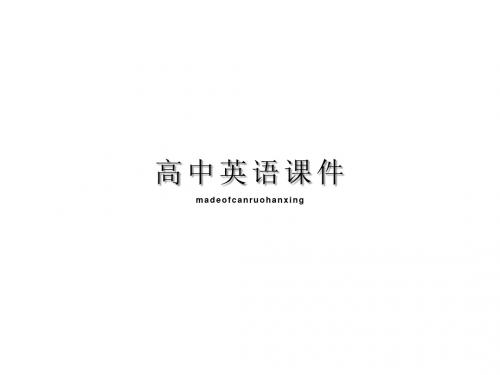
Dear ___________, Our class has been studying a unit on first aid.
Write your principal’
s name
_I_t _h_a_s_b_e_en__v_e_ry__u_se_f_u_l _b_e_ca_u_s_e w_e_h_ave learnt about what to
_d_o_t_o_h_e_lp__so_m_e_o_n_e_w_h_o__h_as___ h_ad_ an accident
Say why the first aid unit has been useful.
_______________________
Even though the unit has been very interesting and wuesewfuolu, l_d__li_k_e_t_o_b_e__a_b_l_e_t_o_d_o_ a f_ir_s_t_a_i_d_c_o_u_r_s_e_._A__f_ir_s_t_a_id____ c_o_u_r_s_e_w__o_u_ld__g_iv_e__u_s________ i_n_fo_r_m__a_t_io_n__a_b_o_u_t_m__a_n_y__m_o_r_e s_it_u_a_t_io_n__s._I_t_w__o_u_ld__a_l_so__g_iv_e__ u_s__th_e__c_h_a_n_c_e_t_o_p_r_a_c_t_is_e__fi_r_st_ a_i_d_t_r_e_a_tm__e_n_t_s_. ________.
In the table below, write down the things your family already does in your house to make it safe and the things that you shouldn’t do in your house. Add any other things your family does to make your home safe. In groups, share your answers.
人教版高中英语必修五book5unit5reading
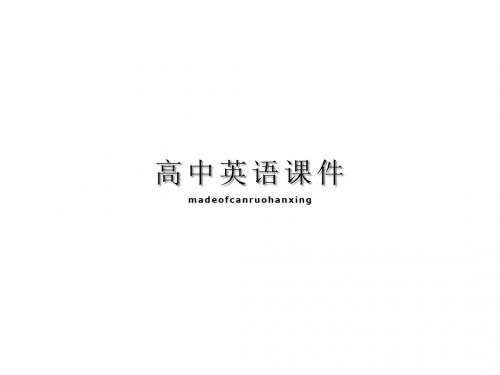
19
Treatment
Decide whether the first aid treatment is Right (R) or Wrong (W). (based on page 35) 1. When someone is burned, you should place some ice on
3
Quiz
How much do you know about First Aid ?
4
1. If a person loses one third of his / her √
blood, he / she may die.
2. In a car accident, we should try to get ×
the wounded out of the car first.
3. If one stops his / her breath about 4 – 5√
minutes, his / her brain will be damaged.
4. Scratches(抓伤) from a family pet ×
vital adj. 至关重要的; 生死攸关的
Expressions preview
electric shock 触电; 电休克 squeeze … out 榨出; 挤出 over and over again 反复; 多次
Discuss what kind of first aid you should give in the
watery surface
Black and white and
人教版新课标高中英语教学(必修5)unit5课件 using language
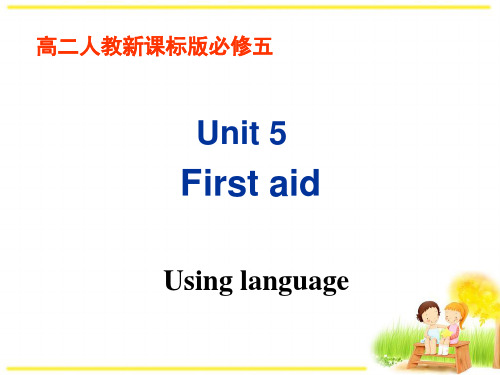
2. What first aid did John perform on Anne?
John dressed Ms Slade’s in juries with tea towels and applied pressure to the wounds to slow the bleeding.
2. What was John doing when he heard the screaming?
They saw a man ran from the scene. 3. What did John and his father see
when they rushed outside? He was studying in his room.
Task 1 Read the text and fill in the blanks.
Who
What did he Where did he
hear
go
John Janson _S_c_r_e_a_m_i_n_g_ _F_r_o_n_t_g_a_r_d_en of Anne Slade
What did he do Where did What did
4. In groups, discuss these questions.
1. Do you think John was silly or brave to get involved in the situation? Give your reasons.
John was silly: he could have been attacked also, it was nine of his business, the woman might have had AIDS. John was brave: he could have been attacked too, but he didn’t think about his own safety. All he thought about was how to help the victim.
人教版英语必修五第五单元详细课件

(2)keep you warm or cool (3)prevent you from losing water (4)give you sense of touch
Causes of burns
The burns can be caused by a 1.________of things.
工具
人教版英语必修5 Unit 5 First aid
3.Match the Characteristics of burns
答案: (1)-B-E;(2)-A-F;(3)-C-D
工具
人教版英语必修5 Unit 5 First aid
4.Treatment (1)________clothing and jewelry near the burn. (2)________the burns with cool water. (3)________cool,clean wet cloths on the burns. (4)________the burned area gently. (5)________the burned area with a dry clean bandage. (6)________the burned area________than the heart , if possible. (7)________the victim________the doctor or hospital , if possible.
(2) The best way to treat a snake bite is:________
人教版必修5第五单元课文
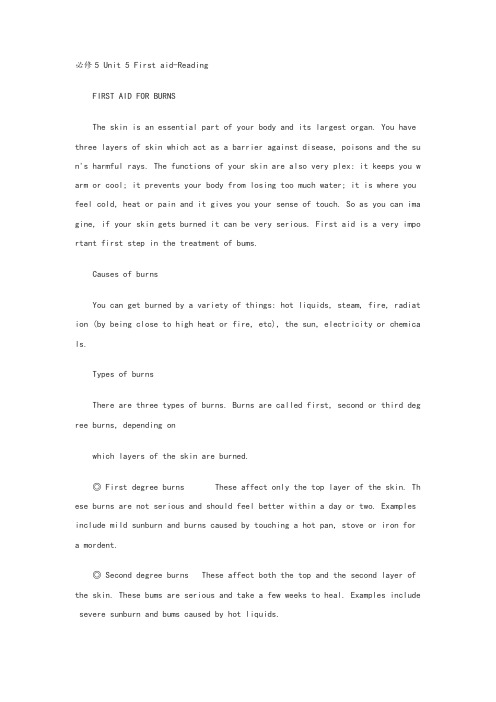
必修5 Unit 5 First aid-ReadingFIRST AID FOR BURNSThe skin is an essential part of your body and its largest organ. You have three layers of skin which act as a barrier against disease, poisons and the su n's harmful rays. The functions of your skin are also very plex: it keeps you w arm or cool; it prevents your body from losing too much water; it is where you feel cold, heat or pain and it gives you your sense of touch. So as you can ima gine, if your skin gets burned it can be very serious. First aid is a very impo rtant first step in the treatment of bums.Causes of burnsYou can get burned by a variety of things: hot liquids, steam, fire, radiat ion (by being close to high heat or fire, etc), the sun, electricity or chemica ls.Types of burnsThere are three types of burns. Burns are called first, second or third deg ree burns, depending onwhich layers of the skin are burned.◎ First degree burns These affect only the top layer of the skin. Th ese burns are not serious and should feel better within a day or two. Examples include mild sunburn and burns caused by touching a hot pan, stove or iron for a mordent.◎ Second degree burns These affect both the top and the second layer of the skin. These bums are serious and take a few weeks to heal. Examples include severe sunburn and bums caused by hot liquids.◎ Third degree burns These affect all three layers of the skin and any tissue and organs under the skin. Examples include burns caused by electric sh ocks, burning clothes, or severe petrol fires. These burns cause very severe in juries and the victim must go to hospital at once.Characteristics of burnsFirst degree burns◎ dry, red and mildly swollen◎ mildly painful◎ turn white when pressedSecond degree burns◎ rough, red and swollen◎ blisters◎ watery surface◎ extremely painfulThird degree burns◎ black and white and charred◎ swollen; often tissue under them can be seen◎ little or no pain if nerves are damaged; may be pain around edge of inju red area.First aid treatment1 Remove clothing using scissors if necessary unless it is stuck to t he burn. Take off other clothing and jewellery near the burn.2 Cool burns immediately with cool but not icy water. It is best to p lace burns under gently running water for about 10 minutes. (The cool water sto ps the burning process, prevents the pain being unbearable and reduces swellin g.) Do not put cold water on third degree burns.3 For first degree burns, place cool, clean, wet cloths on them until the pain is not so bad. For second degree burns, keep cloths cool by putting them back in a basin of cold water, squeezing them out and placing them on the burned area over and over again for about an hour until the pain is not so ba d.4 Dry the burned area gently. Do not rob, as this may break any blister s and the wound may get infected.5 Cover the burned area with a dry, clean bandage that will not stick t o the skin. Hold the bandage in place with tape. Never put butter, oil or ointm ent on bums as they keep the heat in the wounds and may cause infection.6 If bums are on arms or legs, keep them higher than the heart, if poss ible. If bums are on the face, the victim should sit up.7 If the injuries are second or third degree bums, it is vital to get t he victim to the doctor or hospital at once.HEROIC TEENAGER RECEIVES AWARDSeventeen-year-old teenager, John Janson, was honoured at the Lifesaver Awa rds last night in Rivertown for giving lifesaving first aid on his neighbour af ter a shocking knife attack.John was presented with his award at a ceremony which recognized the braver y of ten people who had saved the life of another.John was studying in his room when he heard screaming. When he and his fath er rushed outside, a man ran from the scene. They discovered that Anne Slade, m other of three, had been stabbed repeatedly with a knife. She was lying in her front garden bleeding very heavily. Her hands had almost been cut off.It was John's quick action and knowledge of first aid that saved Ms Slade's life. He immediately asked a number of nearby people for bandages, but when no body could put their hands on any, his father got some tea towels and tape from their house. John used these to treat the most severe injuries to Ms Slade's h ands. He slowed the bleeding by applying pressure to the wounds until the polic e and ambulance arrived."I'm proud of what I did but I was just doing what I'd been taught," John s aid.John had taken part in the Young Lifesaver Scheme at his high school. When congratulating John, Mr Alan Southerton, Director of the Young Lifesaver Scheme said, "There is no doubt that John's quick thinking and the first aid skills h e learned at school saved Ms Slade's life. It shows that a knowledge of first a id can make a real difference."Before receiving their awards last night, John and the nine other Life Save rs attended a special reception yesterday hosted by the Prime Minister.。
- 1、下载文档前请自行甄别文档内容的完整性,平台不提供额外的编辑、内容补充、找答案等附加服务。
- 2、"仅部分预览"的文档,不可在线预览部分如存在完整性等问题,可反馈申请退款(可完整预览的文档不适用该条件!)。
- 3、如文档侵犯您的权益,请联系客服反馈,我们会尽快为您处理(人工客服工作时间:9:00-18:30)。
In the I always bathroom unplug the hairdryer after I’ve used it.
Fill in the blanks.
_________ Make sure the floor is not ________. slippery Always use a _______ ladder to _____ reach high cupboards. cut away from your body when Always ________ you use a knife. _______ Unplug all appliances, especially irons, after use. Keep matches ______________ out of the reach of children.
Reading task
What things at home can be dangerous? electrical equipment electric wires knives hot water windows
poisons
ladders
Discussion
How to prevent us from being injured at home?
4. What advice should the operator have given Mrs. Grant to avoid making the accident worse?
The operator could have advised Sarah Grant not to move her daughter and to keep her warm by putting a blanket over her.
Her leg looks strange — maybe it’s broken. And she hit her head — she’s unconscious. I’ve shouted at her but she won’t wake up. Oh, please hurry. O: Yes, we will… G: Oh thank you, thank you. Goodbye… O: (interrupts) No, no, don’t hang up — we need your address.
O: Emergency. Can I help you? G: You’ve got to help me — my daughter’s had an accident. I don’t know what to do. O: Now calm down. Tell me your name and phone number — slowly. G: Ummm… Sarah Grant. Oh, you’ve got to send an ambulance now.
In the bedroom
My mother keeps bottles of medicine on a high shelf out of the reach of children.
I shouldn’t light candles in my room. My father should never smoke in bed.
1. How do you think the operator sounds? The operator sounds calm and efficient. 2. How does Sarah Grant sound? Sarah Grant sounds worried, frightened and panicky. 3. What does the operator say to Sarah to help her calm down? The operator asks Sarah to speak slowly and take deep breaths.
What could Mrs. Grant have done to avoid the accident happening? She could have given her daughter a ladder to stand on as this is more secure than a table. She could have put the items in a lower cupboard and somewhere that was easy to reach.
Before you read the pamphlet about safety in the home, find out these words in the text. Guess what they mean and then check their meanings in your dictionary. kit slippery ladder stove appliances unplug hair dryer extinguishers curtains wires outlets
Poisons
Don’t pour poisons into other containers, for example, empty bottles. Keep them on a high shelf out of the reach of children.
What must you do if you are badly burnt? Cool the area of skin at once. Wash the area of skin under the cold tap for several minutes. Put a piece of dry clean cloth over the area of the burn.
Listening text
AN EMERGENCY CALL Mrs. Grant (G) is ringing the emergency number. Her daughter has had an accident in the kitchen and is unconscious. Listen to the phone conversation with the operator (O).
Address
12 Loft Street, East Horton
What has Mrs. Grant’s daughter happened? fell from a table and maer head and is unconscious.
Listen to the conversation and complete the table. Name of caller Number of people involved Telephone number Sarah Grant One (Mrs. Grant’s daughter) 6161 9486
Have any accidents ever happened in your house? What happened and why did it happen? How do you think the
accident could have
been prevented?
In the table below, write down the things your family already does in your house to make it safe and the things that you shouldn’t do in your house. Add any other things your family does to make your home safe. In groups, share your answers.
高二人教新课标版必修五
Unit 5
First aid
Workbook
Brainstorming
telephone number
address
information needed to make an emergency phone call
name of caller
…
number of people involved
O: Yes, I will. Now take a deep breath and tell me your phone number. G: Yes, yes … 6161 9486. O: Good. Now tell me what’s happened. G: Well, my daughter was standing on a table in the kitchen and was reaching up to the top cupboard and she fell. Now she’s on the floor.
Things we do In the kitchen
Things we shouldn’t do I shouldn’t stand on a chair to reach things. We shouldn’t leave matches anywhere.
We always let the floor dry after it is washed before we use the kitchen again.
Listen again and answer them.
1. How do you think the operator sounds? 2. How does Sarah Grant sound? 3. What does the operator say to Sarah to help her calm down? 4. What advice should the operator have given Mrs. Grant to avoid making the accident worse?
